General, Sir John Monash, Personal Files Book 22, 2 January - 1 February 1919- Part 1
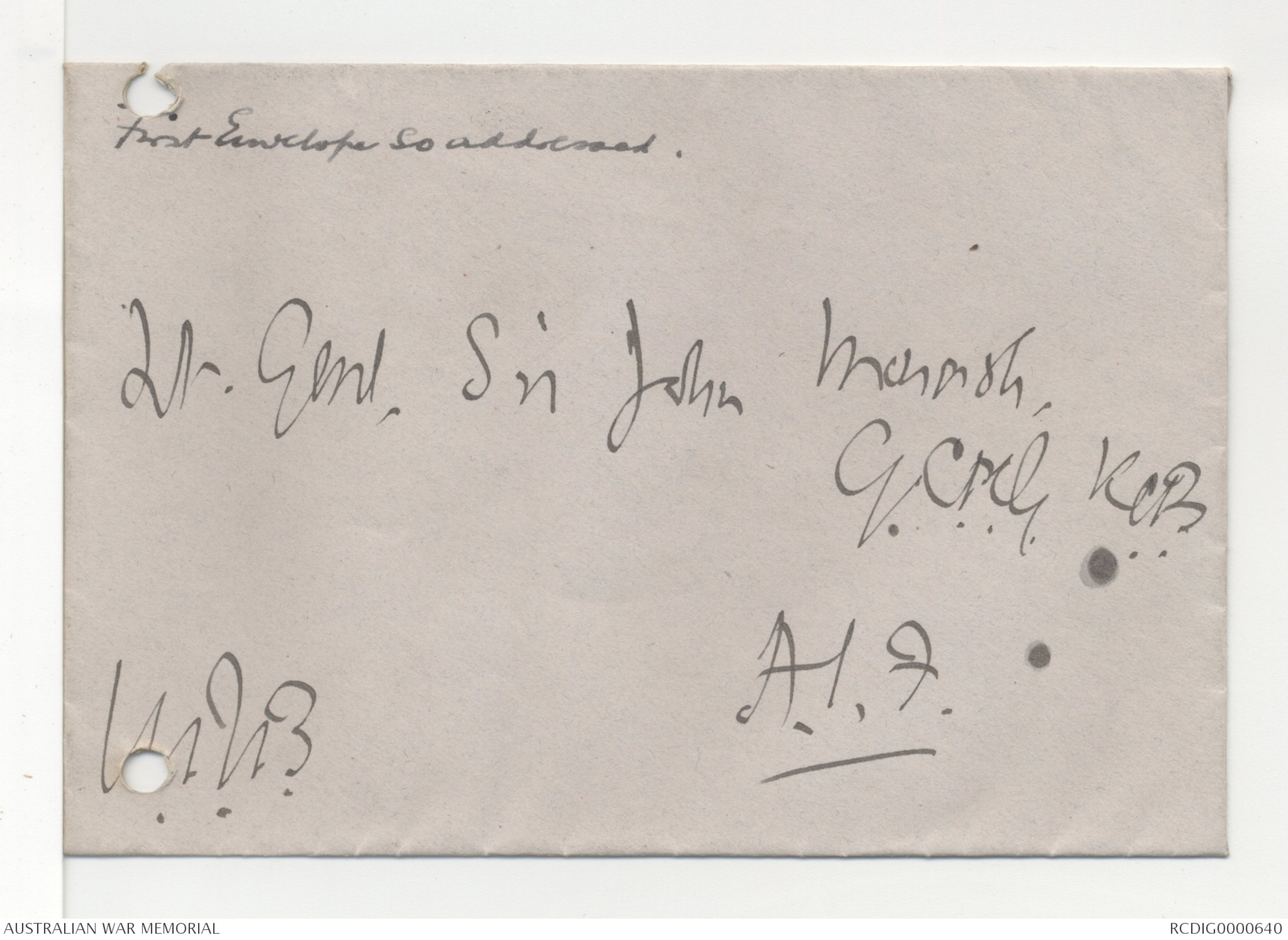
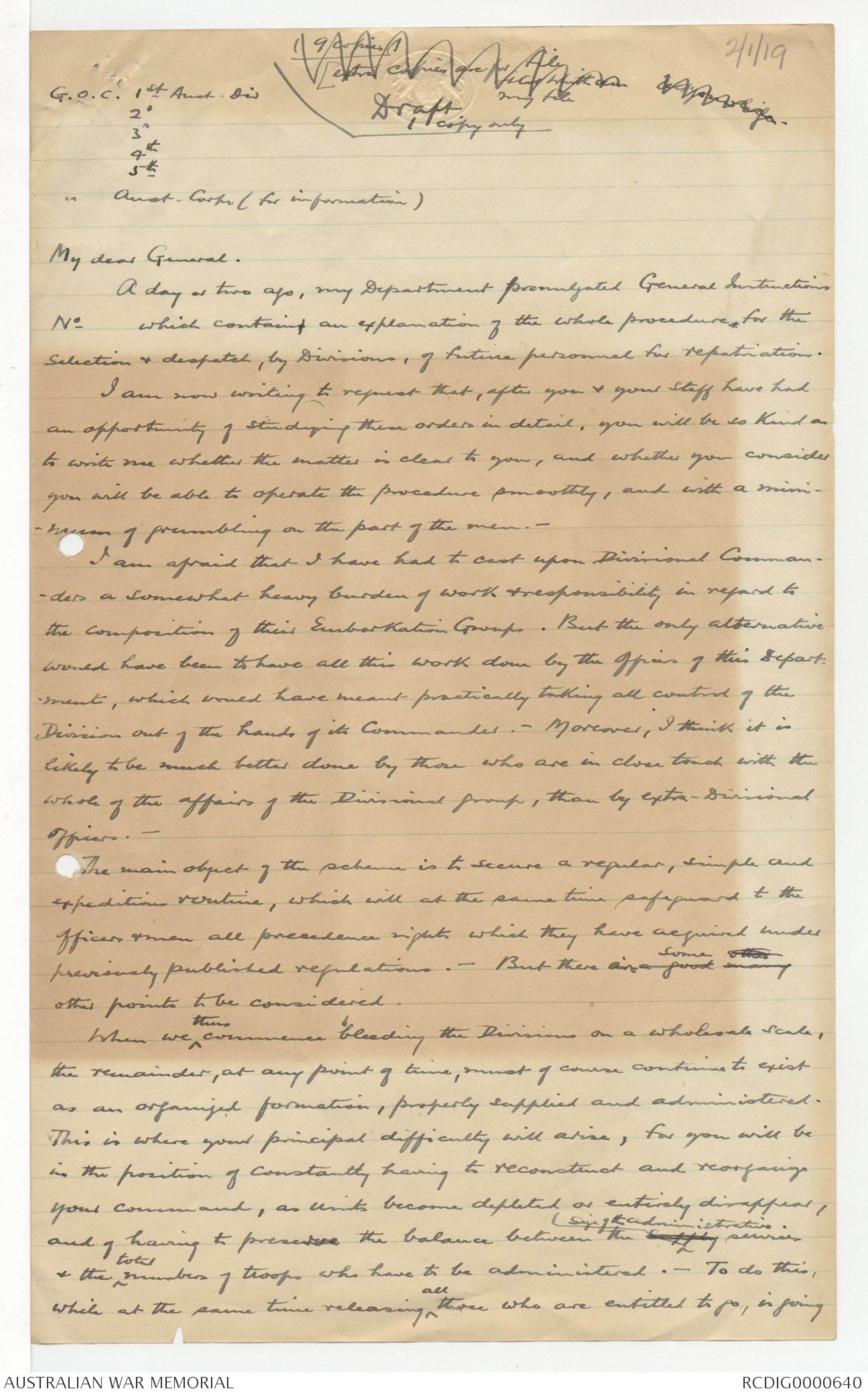
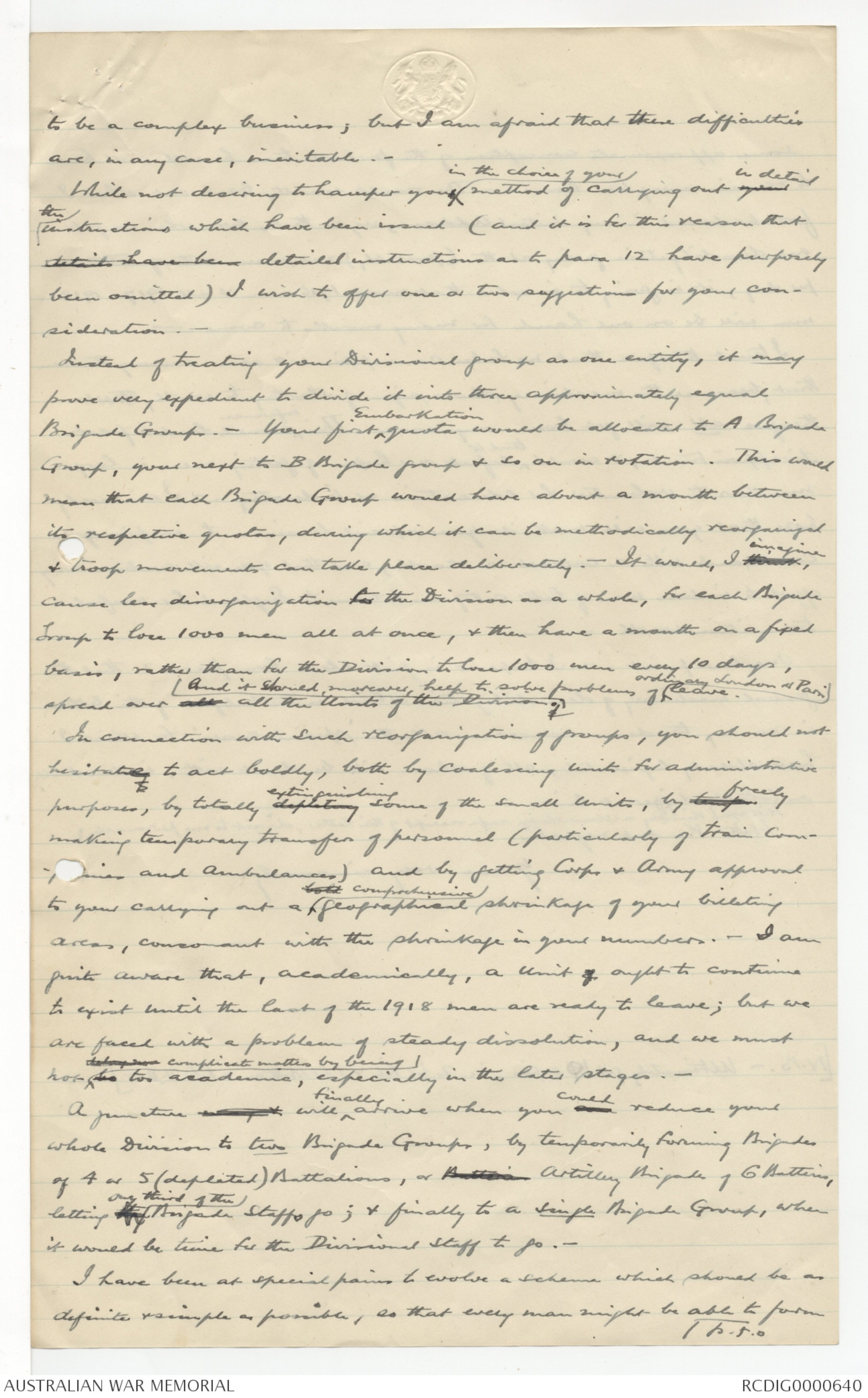
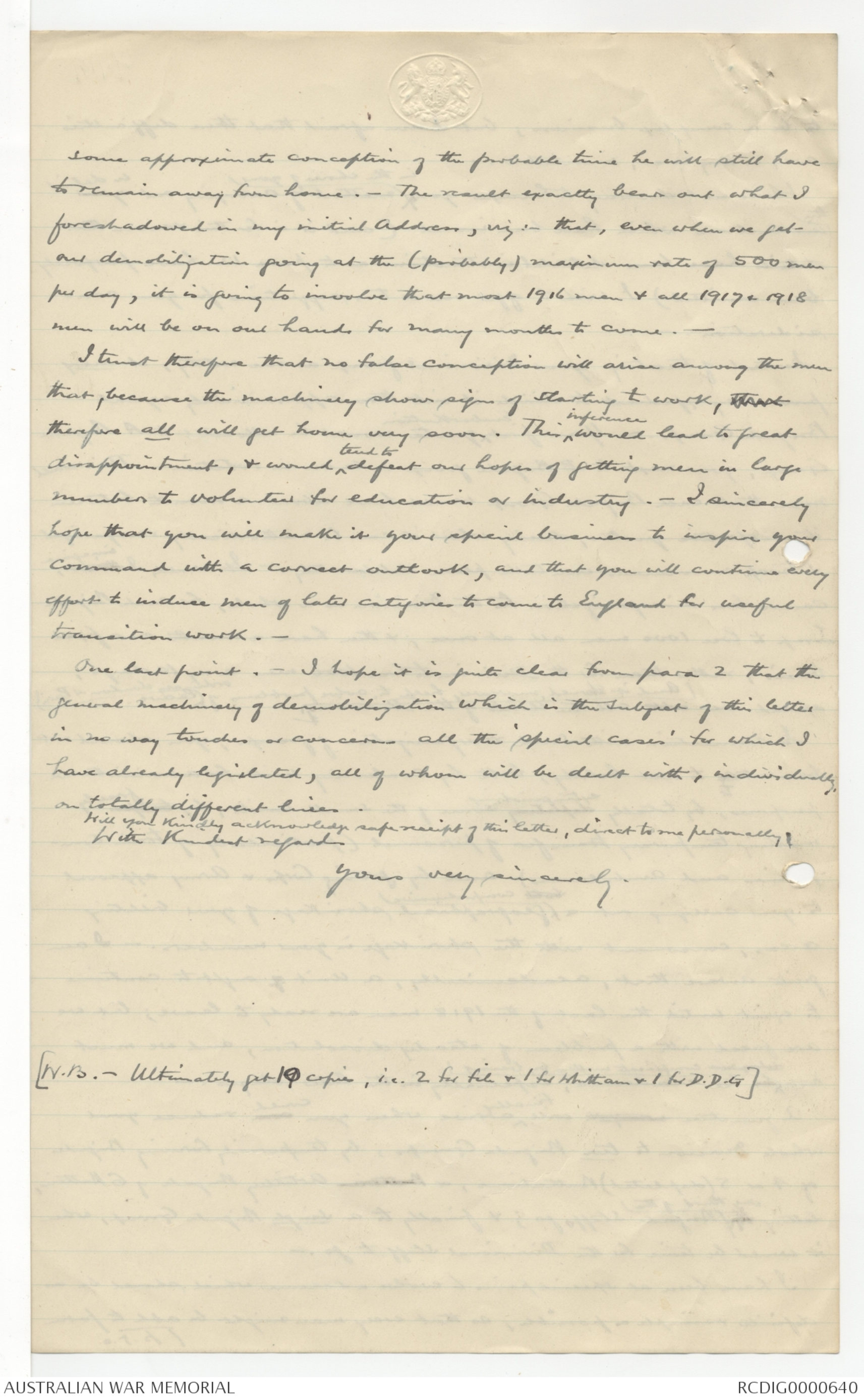
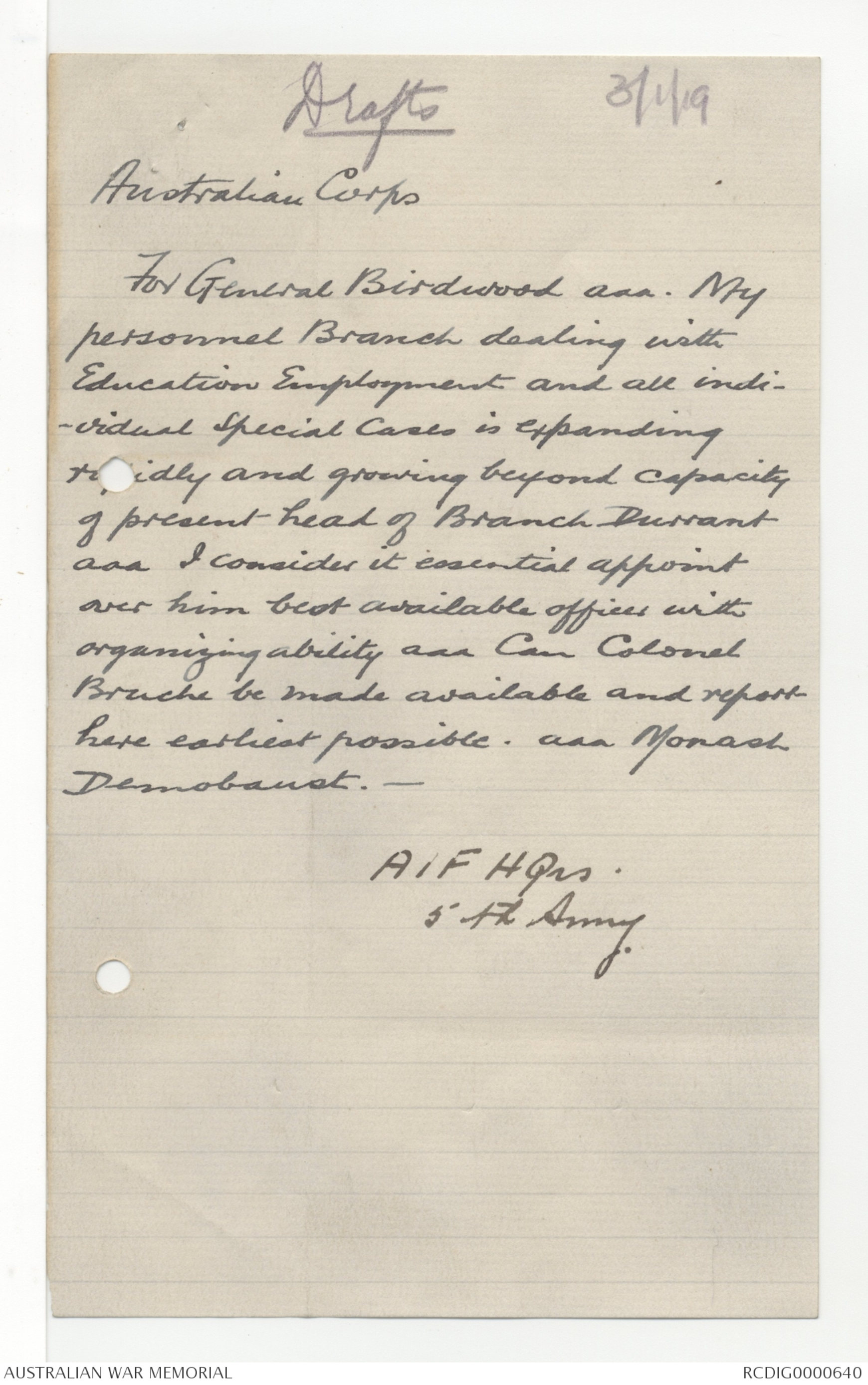
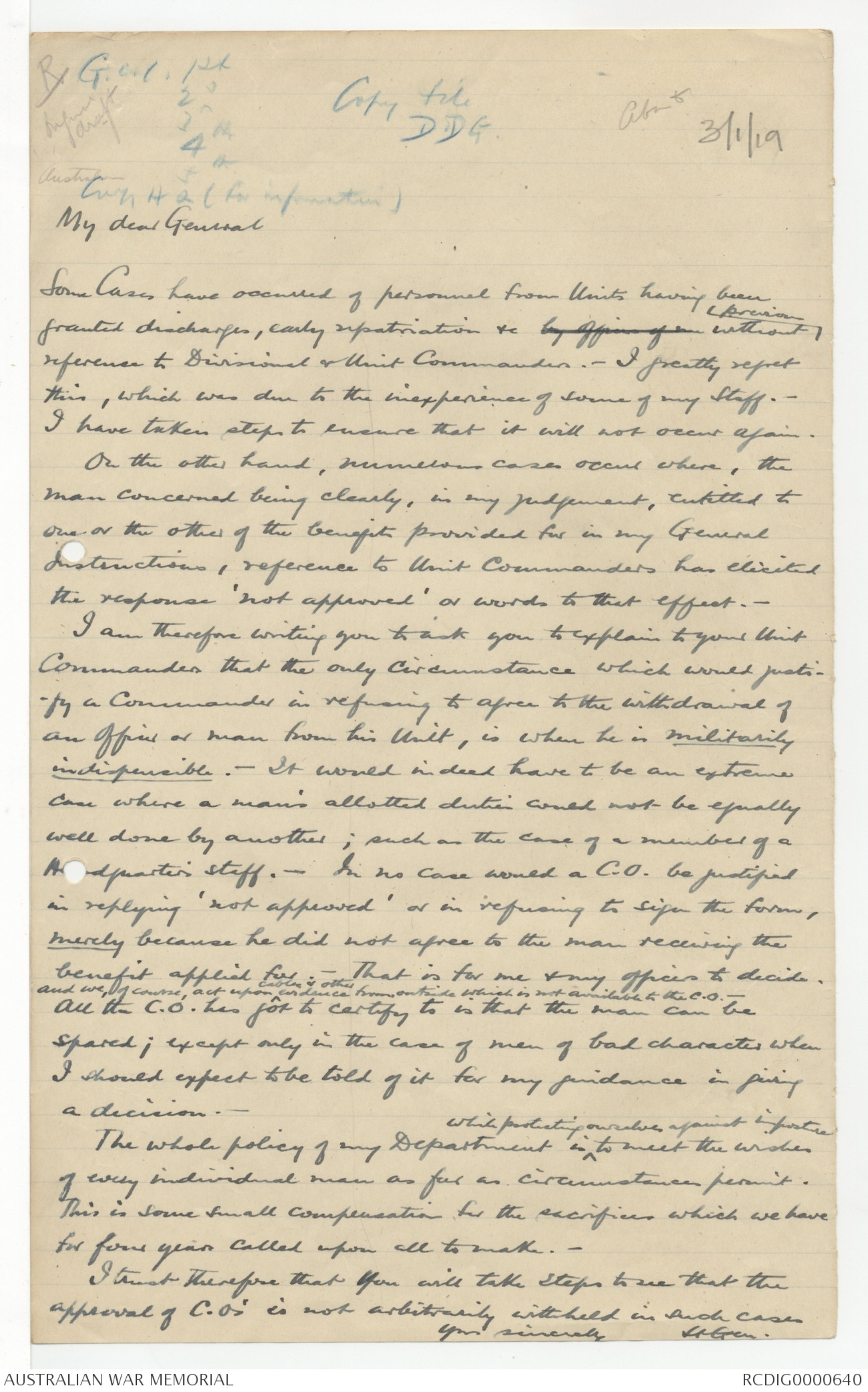
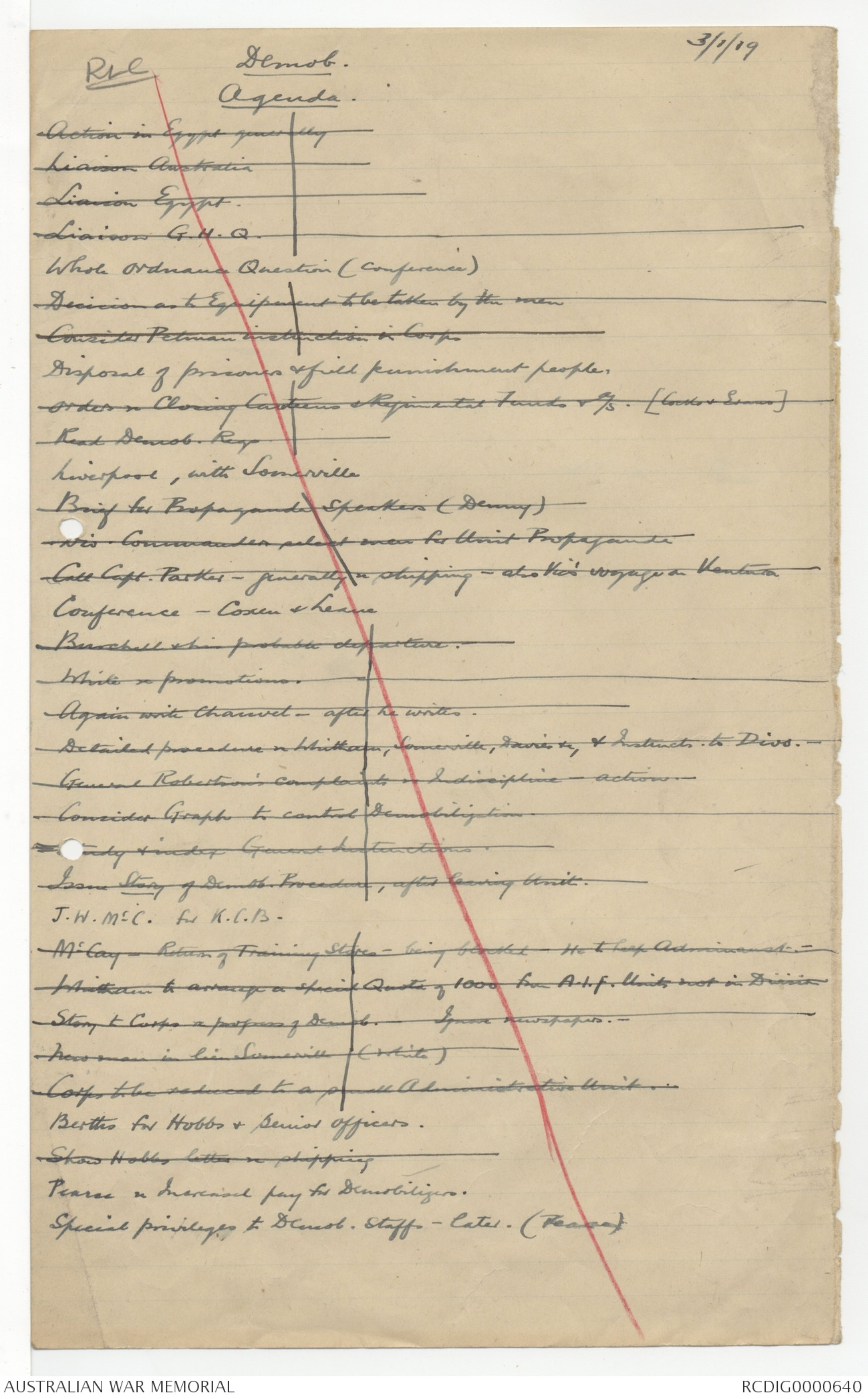
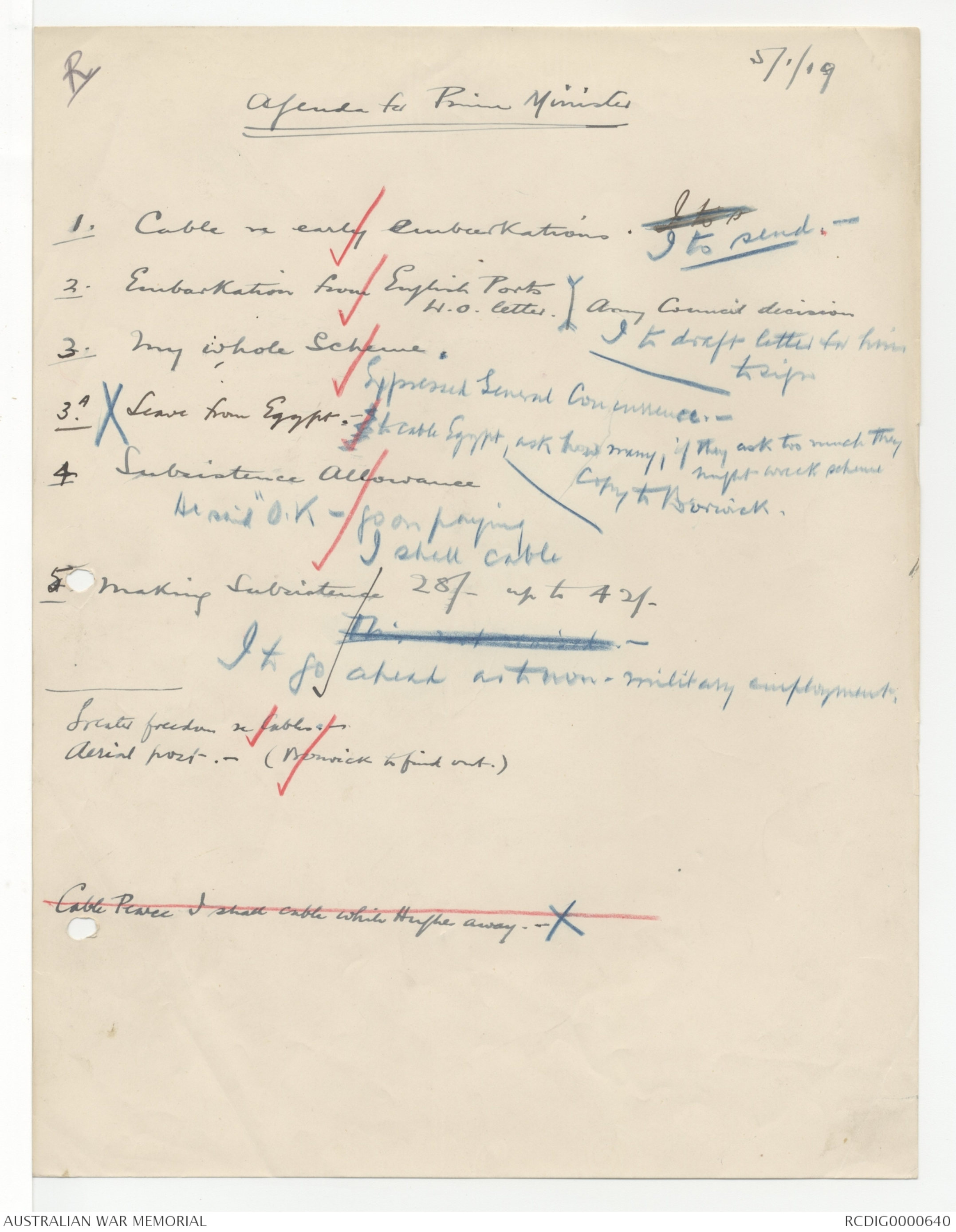
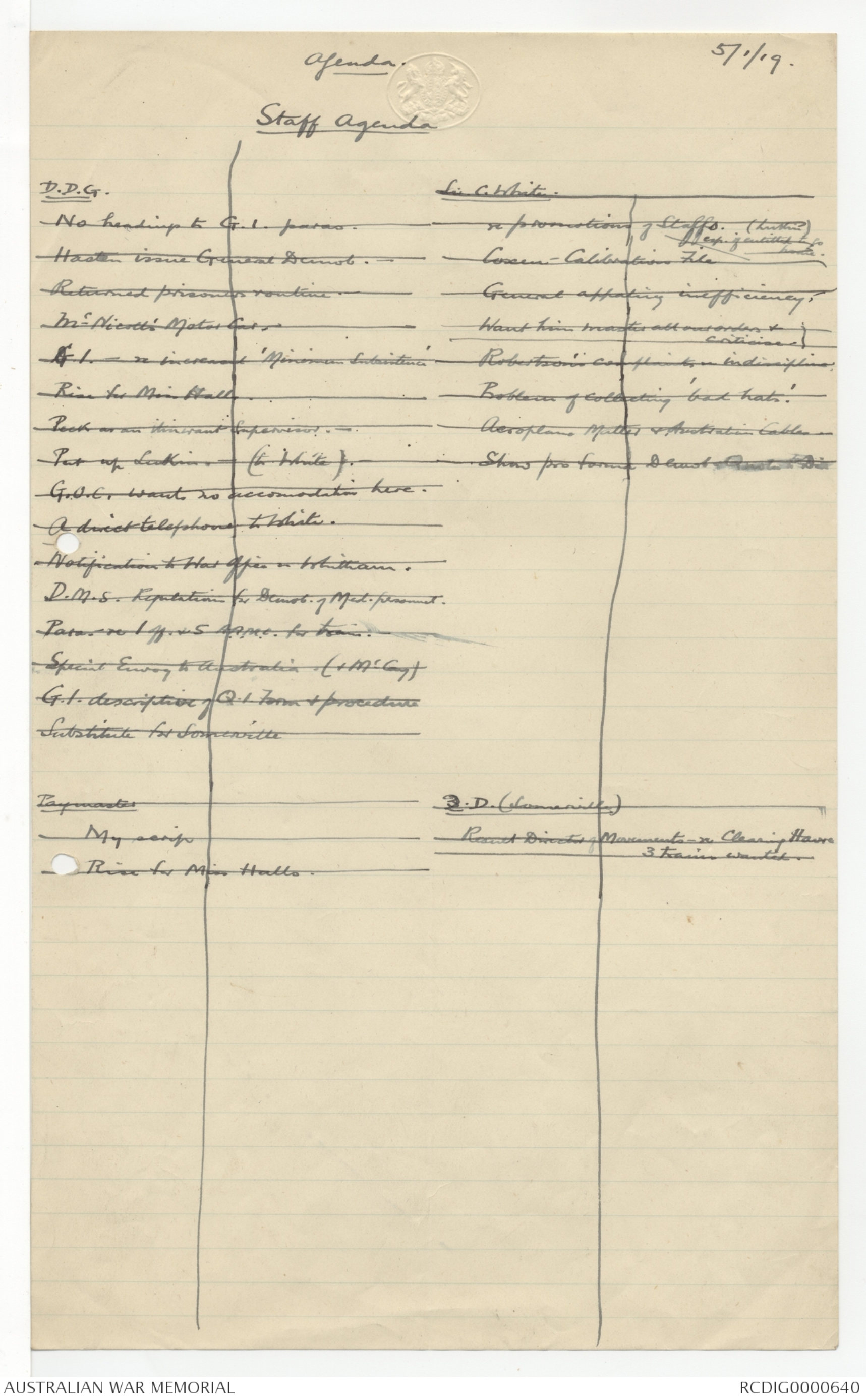
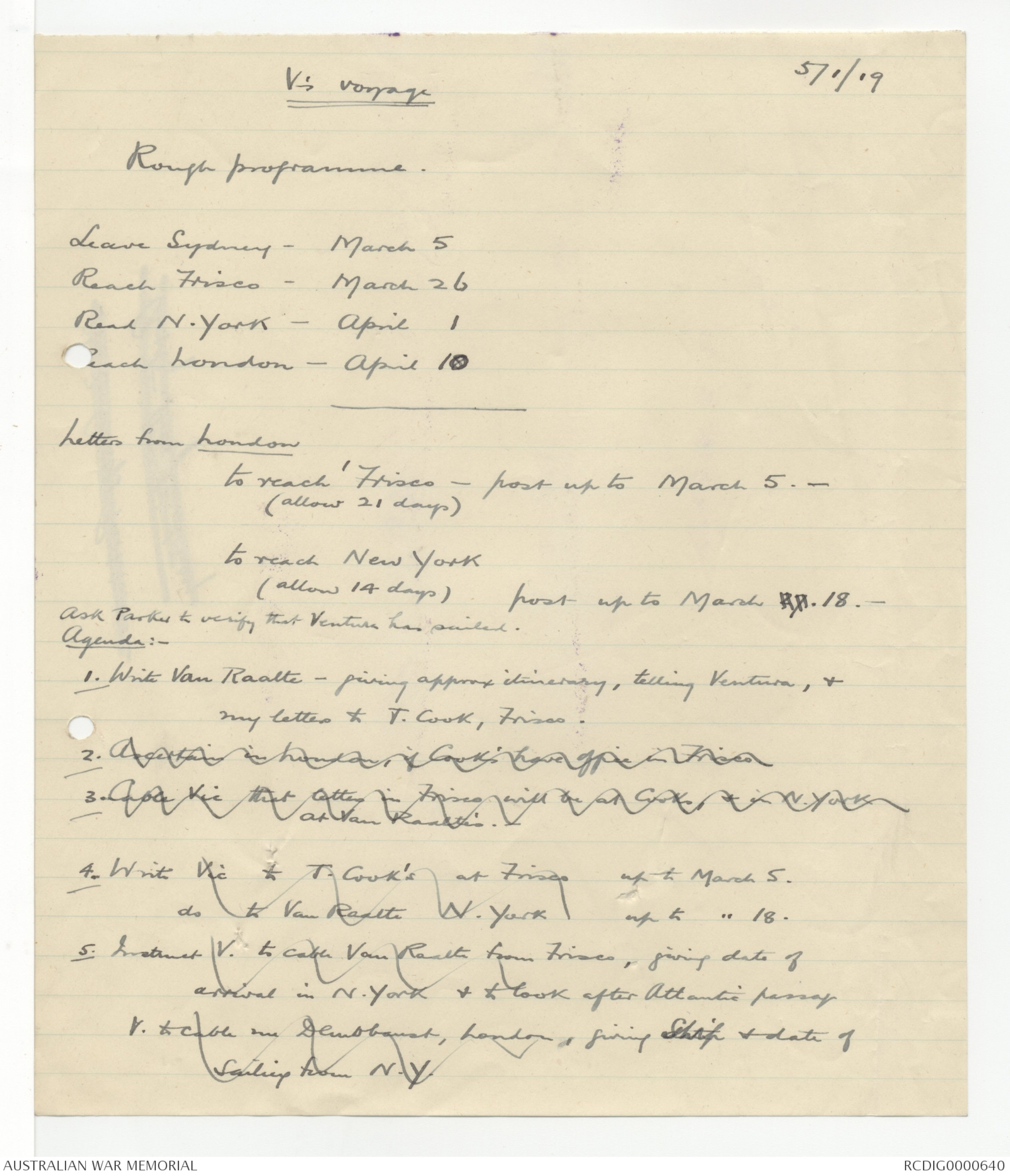
First Envelope so addressed.
Lt. Genl. Sir John Monash.
G.C.M.G. K.C.B
A.I.F.
M.N.Z.
2/1/19
1 9 copies
[extra copies are for file
filing with am
my file
xxxxxx
Draft
1 copy only
G.O.C. 1st Aust. Div
2nd
3rd
4th
5th
" Aust. Corps (for information)
My dear General.
A day or two ago, my Department promulgated General Instructions
No which contains an explanation of the whole procedure, for the
selection & despatch, by Division, of future personnel for repatriation.
I am now writing to request that, after you & your staff have had
an opportunity of studying these orders in detail, you will be so kind as
to write me whether the matter is clear to you, and whether you consider
you will be able to operate the procedure smoothly, and with a minimum
of grumbling on the part of the men. —
I am afraid that I have had to cast upon Divisional Commanders
a somewhat heavy burden of work responsibility in respect to
the composition of their Embarkation Groups. But the only alterative
would have been to have all this work done by the Officers of this Department,
which would have meant practically taking all control of the
Division out of the hands of its Commander. — Moreover, I think it is
likely to be much better done by those who are in close touch with the
whole of the affairs of the Divisional group, than by extra-Divisional
officers. —
The main object of the scheme is to secure a regular, simple and
expeditious routine, which will a the same time safeguard t the
officers & men all precedence rights which they have acquired under
previously published regulations. — But there are a good many some other
other points to be considered.
When we ^thus commence bleeding the Divisions on a wholesale scale,
the remainder, at any point of time, must of course continue to exist
as an organized formation properly supplied and administered.
This is where your principal difficulty will arise, for you will be
in the position of constantly having to reconstruct and reorganize
your command, as Units become depleted or entirely disappear,
and of having to preserve the balance between the supply ^size of the administrative services
& the ^total numbers of troops who have to be administered. — To do this,
while at the same time releasing ^all those who are entitled to go, is going
to be a complex business, but I am afraid that these difficulties
are, in any case, inevitable. —
While not desiring to hamper you ^in the choice of your method of carrying out your in detail
^these instructions which have been issued (and it is for this reason thatdetails have been detailed instructions as to para 12 have purposely
been omitted) I wish to offer one or two suggestions for your consideration.
Instead of treating your Divisional group as one entity, it may
prove very expedient to divide it into three approximately equal
Brigade Groups. — Your first ^Embarkation quota would be allocated to A Brigade
Group, your next to B Brigade group & so on in rotation. This would
mean that each Brigade Group would have about a month between
its respective quotas, during which it can be methodically reorganized
& troop movements can take place deliberately. - It would I think imagine,
cause less disorganization for the Division as a whole, for each Brigade
Troop to lose 1000 men all at once, & then have a month on a fixed
basis, rather than for the Division to lose 1000 men every 10 days,
spread over all all the Units of the Division.& ^And it should, moreover help to solve problems of ^ordinary London or Paris leave.
In connection with such reorganization of groups, you should not
hesitatey to act boldly, both by coalescing Units for administrative
purposes, by totally depleting extinguishing some of the small Units, by tempo freely
making temporary transfers of personnel (particularly of train companies
and ambulances) and by getting Corps & Army approval
to your carrying out a bold ^comprehensive geographical shrinkage of your billeting
areas, consonant with the shrinkage in your numbers. — I am
quite aware that, academically, a Unit of ought to continue
to exist until the last of the 1918 men are ready to leave; but we
are faced with a problem of steady dissolution, and we must
not ^be xxxxxxxx complicate matters by being be too academic, especially in the later stages. —
A juncture xxxxxx will ^finally arrive when you are could reduce your
whole Division to two Brigade Groups, by temporarily forming Brigades
of 4 or 5 (depleted) Battalions, or Battalion Artillery Brigade of 6 Batteries,
letting the ^one third of the Brigade Staffs go; & finally to a single Brigade Group, when
it would be time for the Divisional Staff to go. —
I have been at special pains to evolve a scheme which should be as
definite & simple as possible, as that every man might be able to form
/P.T.O
some approximate conception of the probable time he will still have
to remain away from home. — The result exactly bears out what I
foreshadowed in my initial Address, viz:— that, even when we get
our demobilization going at the (probably) maximum rate of 500 men
per day, it is going to involve that most 1916 men & all 1917 & 1918
men will be on our hands for many months to come. —
I trust therefore that no false conception will arise among the men
that, because the machinery shows signs of starting work, there
therefore all will get home very soon. This ^inference would lead to great
disappointment, & would ^tend to defeat our hopes of getting men in large
numbers to volunteer for education or industry. — I sincerely
hope that you will make it your special business to inspire your
Command with a correct outlook, and that you will continue every
effort to induce men of later categories to come to England for useful
transition work. —
One last point. — I hope it is quite clear from para 2 that the
general machinery of demobilization which is the subject of this letter
in no way touches or concerns all the 'special cases' for which I
have already legislated, all of whom will be dealt with, individually,
on totally different lines.
Will you kindly acknowledge safe receipt of this letter, direct to me personally.
With Kindest regards
Yours very sincerely.
[N.B. - Ultimately get 10 copies, i.e. 2 for file & 1 for Whitham & 1 for D.D.G]
3/1/19
Drafts
Australian Corps
For General Birdwood aaa. My
personnel Branch dealing with
Education Employment and all individual
special cases is expanding
rapidly and growing beyond capacity
of present head of Branch Durrant
aaa I consider it essential appoint
over him best available officer with
organizing ability aaa Can Colonel
Bruche be made available and report
here earliest possible. aaa Monash
Demobaust. -
A I F HQrs.
5th Army.
Abn &
3/1/19
Copy file
D.D.G.
[*R/
(??)
draft*)
G.O.C. 1st
2nd
3rd
4th
5th
Australian
Corps H.Q (for information)
My dear General.
Some Cases have occurred of personnel from Units having been
granted discharges, early repatriation &c by officers of an without ^previous
reference to Divisional & Unit Commanders. — I greatly regret
this, which was due to the inexperience of some of my Staff. —
I have taken steps to ensure that it will not occur again.
On the other hand, numerous cases occur where, the
man concerned being clearly, in my judgement, entitled to
one or the other of the benefits provided for in my General
Instructions, reference to Unit Commanders has elicited
the response "not approved' or words to that effect. —
I am therefore writing you to ask you to explain to your Unit
Commander that the only circumstance which would justify
a Commander in refusing to agree to the withdrawal of
an officer or man from his Unit, is when he is militarily
indispensible. - It would in deed have to be an extreme
case where a man's allotted duties would not be equally
well done by another; such as the case of a member of a
Headquarter's staff. - In no case would a C.O. be justified
in replying 'not approved' or in refusing to sign the form,
merely because he did not agree to the man receiving the
benefit applied for. — That is for me & my officers to decide.
and we, of course, act upon ^cables & other (advice??) from outside which is not available to the C.O. —
All the C.O. has got to certify to is that the man can be
spared; except only in the case of men of bad character when
I should expect to be told of it for my guidance in giving
a decision. —
The whole policy of my Department is ^while protecting ourselves against imposture
of every individual man as far as circumstances permit.
This is some small compensation for the sacrifices which we have
for four years call upon all to make. —
I trust therefore that you will take steps to see that the
approval of C.O's is not arbitrarily withheld in such cases
Yours sincerely
Lt Gen.
3/1/19
RLC
Demob
AgendaAction in Egypt generallyLiaison AustraliaLiaison EgyptLiaison G.H.Q.
Whole Ordnance Question (Conference)Decision as to Equipment to be taken by the manConsider Pelman instruction in CorpsDisposal of prisoners & field punishment people,Orders & Closing Canteens & Regimental Funds & a/s. [Coods & Evans]Read Demob. Reqs.Liverpool, with SomervilleBrief for Propaganda speakers (Denny)Div. Commander select men for Unit PropagandaCall Capt. Parker - generally re shipping - also [[??]] voyage on VenturaConference - Coxen & LeaveBurchell & his probable departure .Write re promotions.Again with Chauvel - after he writes.Detailed procedure re Whitlam, Somerville, Davies &c, & Instructs. to Divs. -General Robertson's complaints re Indiscipline - actions. -Consider Graph to control Demobilization.Study & index General Instructions.Issue Story of Demob. Procedure, after leaving Unit.J.W.McC. for K.C.B.McCay - Return of Training Stores - being blocked - We to keep Adminanst. -Whitlam to arrange a special Quota of 1000 from A.I.F. Units not in DivisionStory to Corps re progress of Demob. Ignore newspapers. -New man in Lieu Somerville (White)Corps to be reduced to a small Administrative Unit.Berths for Hobbs & Senior Officers.Show Hobbs letter re shippingPearse re [[?Ina??]] pay for Demobilization.Special privileges to DCmob. Staffs - Later. (Pearson)
R
5/1/19
Agenda for Prime Minister
1. Cable re early embarkations. √ I to s I to send. —
2. Embarkation from English Ports ↨ Army Council decisions √
W.O. letter I to draft letter for him to sign
3. My whole Scheme. √
3.A X Leave from Egypt. - Expressed General Concurrence. - √
to cable Egypt, ask how many, if they ask too much they
might wreck scheme
Copy to Borwick.
4. Subsistence Allowance √
He said "O.K — go on paying
I shall cable.
5. Making Subsistence 28/- up to 42/- √This not xxxxxxx. —
I to go ahead as to non-military employment. √
______
Greater freedom re Cables. — √
Assist post. — (Borwick to find out.) √
Cable Pearce I shall cable while Hughes away. - X
5/1/19.
Agenda
Staff Agenda
5/1/19
V's voyage
Rough programme.
Leave Sydney - March 5
Reach Frisco - March 26
Reach N.York - April 1
Reach London - April 10
_____________________
Letters from London
to reach 'Frisco - post up to March 5. -
(allow 21 days)
to reach New York
(allow 14 days) post up to March 27. 18. -
Ask Parker to verify that Ventura has sailed.
Agenda:-
1. Write Van Raalte — giving approx itinerary, telling Ventura, &
my letters to T. Cook, Frisco.
2. Ascertain in London, if Cook's have office in Frisco
3. Cable Vic that letters in Frisco will be at Cooks, & in N. Yorkat Van Raalte's.
4. Write Vic to T. Cook's at Frisco up to March 5. do to Van Raalte N. York up to " 18.
5. Instruct V. to cable Van Raalte from Frisco, giving date ofarrival in N. York & to Cook after Atlantic passageV. to cable me Demobaust, London, giving Ship & date ofsailing from N.Y.
 Sam scott
Sam scottThis transcription item is now locked to you for editing. To release the lock either Save your changes or Cancel.
This lock will be automatically released after 60 minutes of inactivity.